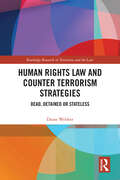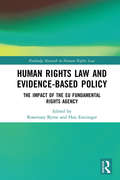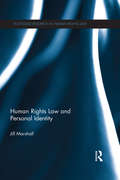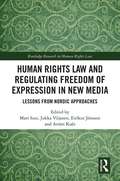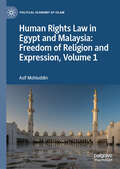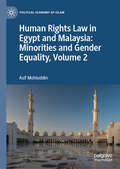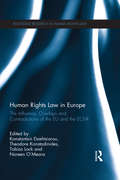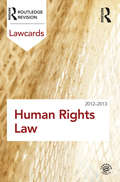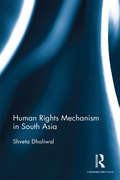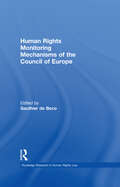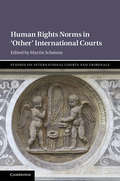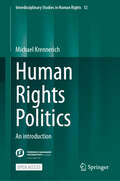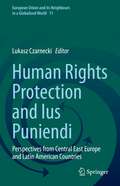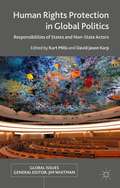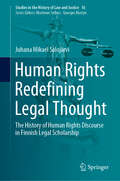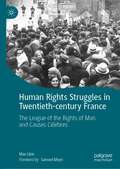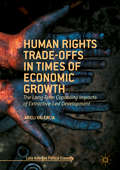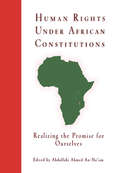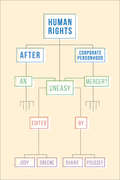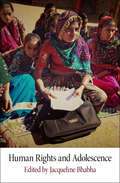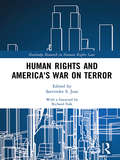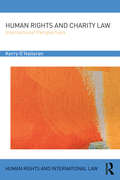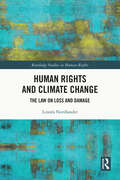- Table View
- List View
Human Rights Law and Counter Terrorism Strategies: Dead, Detained or Stateless (Routledge Research in Terrorism and the Law)
by Diane WebberIn 2006, the United Nations urged Member States to ensure that counter terrorism policies guaranteed respect for human rights and the rule of law. This book demonstrates that, in many cases, counter terrorism policies relating to preventive detention, targeted killing and measures relating to returning foreign terrorist fighters have failed to respect human rights, and this encourages vulnerable people to be drawn towards supporting or committing acts of terrorism. Furthermore, in recent years, jurisprudence and public opinion in some countries have shifted from being at one stage more protective of human rights, to an acquiescence that some particularly draconian counter terrorism methods are necessary and acceptable. This book analyzes why this has happened, with a focus on the United States, United Kingdom, and Israel, and offers suggestions to address this issue. The work will be essential reading for students, academics and policy-makers working in the areas of human rights, humanitarian law, and counter terrorism.
Human Rights Law and Evidence-Based Policy: The Role of the EU Fundamental Rights Agency (Routledge Research in Human Rights Law)
by Han Entzinger Rosemary ByrneThe EU Fundamental Rights Agency (FRA) was established to provide evidence-based policy advice to EU institutions and Member States. By blending social science research with traditional normative work, it aims to influence human rights policy processes through new ways of framing empirical realities. The contributors to this volume critically examine the experience of the Agency in its first decade, exploring FRA’s historical, political and legal foundations and its evolving record across major strands of EU fundamental rights. Central themes arising from these chapters include consideration of how the Agency manages the tension between a mandate to advise and the more traditional approach of human rights bodies to ‘monitor’, and how its research impacts the delicate equilibrium between these two contesting roles. FRA's experience as the first ‘embedded’ human rights agency is also highlighted, suggesting a role for alternative and less oppositional orientations for human rights research. While authors observe the benefits of the technocratic approach to human rights research that is a hallmark of FRA’s evidence-based policy advice, they also note its constraints. FRA’s policy work requires a continued awareness of political realities in Brussels, Member States, and civil society. Consequently, the complex process of determining the Agency’s research agenda reflects the strategic priorities of key actors. This is an important factor in the Agency’s role in the EU human rights landscape. This pioneering position of the Agency should invite reflection on new forms of institutionalized human rights research for the future.
Human Rights Law and Personal Identity: Human Rights Law And Personal Identity (Routledge Research in Human Rights Law)
by Jill MarshallThis book explores the role human rights law plays in the formation, and protection, of our personal identities. Drawing from a range of disciplines, Jill Marshall examines how human rights law includes and excludes specific types of identity, which feed into moral norms of human freedom and human dignity and their translation into legal rights. The book takes on a three part structure. Part I traces the definition of identity, and follows the evolution of, and protects, a right to personal identity and personality within human rights law. It specifically examines the development of a right to personal identity as property, the inter-subjective nature of identity, and the intercession of power and inequality. Part II evaluates past and contemporary attempts to describe the core of personal identity, including theories concerning the soul, the rational mind, and the growing influence of neuroscience and genetics in explaining what it means to be human. It also explores the inter-relation and conflict between universal principles and culturally specific rights. Part III focuses on issues and case law that can be interpreted as allowing self-determination. Marshall argues that while in an age of individual identity, people are increasingly obliged to live in conformed ways, pushing out identities that do not fit with what is acceptable. Drawing on feminist theory, the book concludes by arguing how human rights law would be better interpreted as a force to enable respect for human dignity and freedom, interpreted as empowerment and self-determination whilst acknowledging our inter-subjective identities. In drawing on socio-legal, philosophical, biological and feminist outlooks, this book is truly interdisciplinary, and will be of great interest and use to scholars and students of human rights law, legal and social theory, gender and cultural studies.
Human Rights Law and Regulating Freedom of Expression in New Media: Lessons from Nordic Approaches (Routledge Research in Human Rights Law)
by Mart Susi Jukka Viljanen Eiríkur Jónsson Artūrs KučsThe Nordic countries are well known globally for their high human rights standards and, at the same time, high degree of internet freedom. This edited collection reveals how the Nordic countries have succeeded in the task of protecting freedom of expression in the new media. It contains an overview of public policy choices and best practices of domestic online companies, which have the aspiration of finding global acceptance. Reviewing the topic of freedom of expression in new media within Nordic and Baltic countries, this book incorporates both general themes and interesting country-specific themes that will provide wider knowledge on the development of freedom of expression and media law in the online media era. A comprehensive analysis of regulation of online media, both at the level of legislation and application of law in courts and other authorities, are included. This book will contribute to the ongoing discussion as to whether there is a need to modify prevailing interpretation of freedom of expression. Human Rights Law and Regulating Freedom of Expression in New Media focuses on the multi-layered and complicated relationship between internet and human rights law. It contributes to the ongoing discussion regarding the protection of freedom of expression on the internet in the context of various doctrines of constitutional law, including the proliferation of constitutional adjudication. It will be of interest to researchers, academics, policymakers, and students in the fields of human rights law, internet law, political science, sociology, cultural studies, media and communications studies and technology.
Human Rights Law in Egypt and Malaysia: Freedom of Religion and Expression, Volume 1 (Political Economy of Islam)
by Asif MohiuddinThe discourse surrounding freedom of religion and expression in Muslim-majority countries is complex and multifaceted, shaped by a myriad of factors including cultural, political, and legal dynamics. This volume examines the complex interplay of these factors within the contexts of Egypt and Malaysia, offering valuable insights into the challenges and advancements in safeguarding these fundamental freedoms. From the diverse interpretations of Islamic principles to the varying legal frameworks and the influence of global events, such as geopolitical conflicts and terrorism, on human rights dynamics, this volume provides a comprehensive exploration of the complexities involved. Moreover, it delves into the historical, social, and political contexts that shape the protection and limitation of these freedoms, offering a nuanced understanding of the evolving discourse surrounding human rights in Muslim-majority countries. Through comparative analyses and discussions on the role of civil society and advocacy groups, this volume serves as an invaluable resource for scholars, policymakers, and activists seeking to deepen their understanding of the multifaceted realm of freedom of religion and expression in Egypt and Malaysia.
Human Rights Law in Egypt and Malaysia: Minorities and Gender Equality, Volume 2 (Political Economy of Islam)
by Asif MohiuddinIn Muslim-majority countries, safeguarding minority rights and advancing gender equality are vital components of the broader human rights discussion. Minority rights encompass various groups, including ethnic, religious, and linguistic minorities, who often face discrimination, marginalisation and unequal treatment within society. These challenges are rooted in historical, cultural and socio-political factors that shape legal frameworks and societal attitudes towards minority communities. Similarly, gender dynamics play a significant role in the human rights discourse in these nations, as women encounter various forms of discrimination and inequality, such as limited access to education, employment, and participation in decision-making processes. This volume explores the legal frameworks concerning minority rights and gender equality in Egypt and Malaysia, shedding light on the challenges faced by marginalised groups in these countries. It evaluates the effectiveness of legal instruments and mechanisms in addressing discrimination and promoting inclusivity within these societies. Furthermore, it examines laws, government policies and court rulings related to women’s rights, covering essential topics such as education, employment and political engagement. This volume offers valuable insights for policymakers, legal practitioners, academics and activists dedicated to understanding and advocating for human rights in these societies.
Human Rights Law in Europe: The Influence, Overlaps and Contradictions of the EU and the ECHR (Routledge Research in Human Rights Law)
by Kanstantsin Dzehtsiarou Theodore Konstadinides Tobias Lock Noreen O’MearaThis book provides analysis and critique of the dual protection of human rights in Europe by assessing the developing legal relationship between the Court of Justice of the European Union (CJEU) and the European Court of Human Rights (ECtHR). The book offers a comprehensive consideration of the institutional framework, adjudicatory approaches, and the protection of material rights within the law of the European Union and the European Convention on Human Rights (ECHR). It particularly explores the involvement and participation of stakeholders in the functioning of the EU and the ECtHR, and asks how well the new legal model of ‘the EU under the ECtHR’ compares to current EU law, the ECHR and general international law. Including contributions from leading scholars in the field, each chapter sets out specific case-studies that illustrate the tensions and synergies emergent from the EU-ECHR relationship. In so doing, the book highlights the overlap and dialectic between Europe’s two primary international courts. The book will be of great interest to students and researchers of European Law and Human Rights.
Human Rights Lawcards 2012-2013 (Lawcards)
by RoutledgeRoutledge Lawcards are your complete, pocket-sized guides to key examinable areas of the undergraduate law curriculum and the CPE/GDL. Their concise text, user-friendly layout and compact format make them an ideal revision aid. Helping you to identify, understand and commit to memory the salient points of each area of the law, shouldn’t you make Routledge Lawcards your essential revision companions? Fully updated and revised with all the most important recent legal developments, Routledge Lawcards are packed with features: Revision checklists help you to consolidate the key issues within each topic Colour coded highlighting really makes cases and legislation stand out Full tables of cases and legislation make for easy reference Boxed case notes pick out the cases that are most likely to come up in exams Diagrams and flowcharts clarify and condense complex and important topics '...an excellent starting point for any enthusiastic reviser. The books are concise and get right down to the nitty-gritty of each topic.' - Lex Magazine Routledge Lawcards are supported by a Companion Website offering: Flashcard glossaries allowing you to test your understanding of key terms and definitions Multiple Choice Questions to test and consolidate your revision of each chapter Advice and tips to help you better plan your revision and prepare for your exams Titles in the Series: Commercial Law; Company Law; Constitutional Law; Contract Law; Criminal Law; Employment Law; English Legal System; European Union Law; Evidence; Equity and Trusts; Family Law; Human Rights; Intellectual Property Law; Jurisprudence; Land Law; Tort Law
Human Rights Mechanism in South Asia
by Shveta DhaliwalShveta Dhaliwal teaches at the Rajiv Gandhi National University of Law, Punjab, Patiala, India. Her areas of specialisation are geopolitics, regional human rights systems, comparative political thought and international relations. She has published more than 40 research papers and presented over 150 papers in international and national conferences. She has an authored and three edited books to her credit. She is member of the Indian Political Science Association and the Indian Society of International Law and South Asian Foundation.
Human Rights Monitoring Mechanisms of the Council of Europe (Routledge Research in Human Rights Law)
by Gauthier De BecoThe book studies the human rights monitoring mechanisms of the Council of Europe. It provides an in-depth examination of six such mechanisms: the Commissioner for Human Rights, the European Committee for the Prevention of Torture and Inhuman or Degrading Treatment or Punishment (the CPT), the European Committee of Social Rights (the ECSR), the Advisory Committee on the Framework Convention for the Protection of National Minorities (the ACFC), the European Commission against Racism and Intolerance (ECRI) and the Committee of Experts of the European Charter for Regional or Minority Languages (the CECL). The human rights monitoring mechanisms of the Council of Europe seek to establish a permanent dialogue with governments to encourage them to better implement human rights treaties. They function principally through the use of national reports, on which basis they make recommendations, and may also visit or question states directly. The book looks at each mechanism in turn, discussing their composition, functions and working methods, as well as their relationship with other actors. It includes both a general discussion of the role of European human rights monitoring mechanisms as well as a comparative analysis of these mechanisms. The book aims to provide a clear understanding of the underlying approach of European human rights monitoring mechanisms and the challenges faced by them in terms of effectiveness. It will be useful for practitioners and students alike, especially those following courses in human rights or related fields.
Human Rights Norms in ‘Other' International Courts (Studies on International Courts and Tribunals)
by Martin ScheininThis unique book examines the role and impact of human rights norms in international courts other than human rights courts. It covers a whole range of courts and jurisdictions, looking at the practice of prominent international courts, such as the International Court of Justice and the International Criminal Court, as well as various fora of economic adjudication, including the World Trade Organisation, regional integration organisations in Europe and Africa, and investment arbitration. The book systematically explores the role of human rights norms at the International Tribunal for the Law of the Sea, thereby providing an insight into the future evolution of environmental law towards judicial enforcement at the international level. Within each jurisdiction under study, the respective authors, who all are experts within their fields, address the role of different categories of human rights, as well as the range of available modes of operation of human rights norms.
Human Rights Obligations of Business
by Surya Deva David BilchitzIn recent years, the UN Human Rights Council has approved the 'Respect, Protect, and Remedy' Framework and endorsed the Guiding Principles on Business and Human Rights. These developments have been welcomed widely, but do they adequately address the challenges concerning the human rights obligations of business? This volume of essays engages critically with these important developments. The chapters revolve around four key issues: the process and methodology adopted in arriving at these documents; the source and justification of corporate human rights obligations; the nature and extent of such obligations; and the implementation and enforcement thereof. In addition to highlighting several critical deficits in these documents, the contributing authors also outline a vision for the twenty-first century in which companies have obligations to society that go beyond the responsibility to respect human rights.
Human Rights Politics: An introduction (Interdisciplinary Studies in Human Rights #12)
by Michael KrennerichThe book offers a comprehensive and clear introduction for students and those interested in human rights, written by a renowned human rights expert. It not only provides an introduction to the diversity of issues, actors and institutions in human rights policy and politics, but also offers assistance and suggestions on how the complex reality of human rights politics can be described and analysed with the help of political science and related disciplines. It deals with civil society engagement in human rights as well as state obligations and international efforts to protect human rights.This is an open access book.
Human Rights Protection and Ius Puniendi: Perspectives from Central East Europe and Latin American Countries (European Union and its Neighbours in a Globalized World #11)
by Lukasz CzarneckiThis book examines human rights and penitentiary law in Central Eastern European and Latin American countries from a comparative perspective. How are penitentiary systems and human rights currently being transformed in both regions? This question guides contributors hailing from both Central Eastern Europe and Latin America, filling the gaps at both the international and national level. The book compares Central Eastern European countries with Latin American countries, shedding new light on similarities and differences alike.The main themes of this book are the analysis of penitentiary systems in different countries and a general analysis of criminal and criminological issues. The respective chapters examine how penitentiary laws are changing within different contexts and regulatory regimes. The book seeks to cross boundaries to understand new divisions, fragmentations, and forms of authoritarianism in today’s world, more specifically in Poland, North Macedonia, Chile, Argentina, Peru and Mexico.
Human Rights Protection in Global Politics
by David Jason Karp Kurt MillsHuman Rights Protection in Global Politics analyzes the contemporary human rights responsibilities of state, non-state and international actors. It includes an interdisciplinary set of perspectives based in international relations, politics, law and philosophy. The book seeks to understand but also to critique and to move beyond the contributions of, firstly, the 'respect-protect-fulfil' tripartite division of human rights responsibility, and secondly, the more recent 'Responsibility to Protect' policy framework. It rejects approaches that treat duties to respect, not to harm, or not to violate human rights as entirely constitutive of the responsibilities that global actors have. The book's contributors engage in dialogue with each other, and sometimes even disagree. However, they are unified in their attempt to paint a more complex picture than is currently available about the nature of human rights protection and various global actors' responsibility for it. "
Human Rights Redefining Legal Thought: The History of Human Rights Discourse in Finnish Legal Scholarship (Studies in the History of Law and Justice #16)
by Juhana Mikael SalojärviThis book investigates the origins and development of human rights discourse in Finnish legal scholarship in the twentieth century. It provides a detailed account of how human rights were understood before they had legal relevance in a positivist sense, how they were adapted to Finnish legal thinking in the post-Second World War decades, how they developed into a mode of legal rhetoric and a type of legal argument during the 1970s and 1980s, and how they eventually became a significant paradigm in legal thinking in the 1990s. The book also demonstrates how rights discourse infiltrated the discussion regarding problems that were previously addressed in arguments concerning morals, social justice and equity. Although the book focuses on the history of Finnish legal scholarship, it is also interesting from a global perspective for two reasons: Firstly, it demonstrates how an idea of international law is transplanted and diffused into national legal thinking; Finland is an illustrative example in this regard. Secondly, it offers insights into the general history of human rights.
Human Rights Struggles in Twentieth-century France: The League of the Rights of Man and Causes Célèbres (Palgrave Studies in the History of Social Movements)
by Max LikinThis book provides an introduction to human rights controversies in twentieth-century France, from the Dreyfus Affair at the beginning of the century, to the arguments over women and immigrants’ rights at its end. Using the Ligue des Droits de L’Homme (LDH) - or the League of the Rights of Man - as a narrative thread for this chronological study, the book tracks the gradual expansion of human rights in France in the wake of the two world wars, the Algerian quagmire and decolonisation more generally. Examining the capital role of the LDH whilst also highlighting the role of individuals and key activists, the book helps us to contextualise the quandaries faced by unseen minorities, particularly colonial subjects and women. The analysis also demonstrates the influence of French human rights activism on key international documents of human rights law, such as the Universal Declaration of Human Rights. The LDH occupies a central place in French justice debates and is therefore an ideal template to analyse the rising influence of humanitarianism and crimes against humanity in French causes célèbres from the 1970s onwards. However, the author goes further to look beyond the LDH and even France itself, offering wide-ranging surveys of dominant rights issues across Europe at any given period. Drawing on extensive research and interviews with key members of the LDH, this book provides an accessible overview of human rights struggles in twentieth-century France.
Human Rights Trade-Offs in Times of Economic Growth: The Long-Term Capability Impacts of Extractive-Led Development (Latin American Political Economy)
by Areli ValenciaThis book uncovers a historical dependency on smelting activities that has trapped inhabitants of La Oroya, Peru, in a context of systemic lack of freedom. La Oroya has been named one of the most polluted places on the planet by the US Blacksmith Institute. Residents face the dilemma of whether to defend their health or to preserve job stability at the local smelter, the main source of toxic pollution in town. Valencia unpacks this paradoxical human rights trade-off. This context, shaped by social, historical, political, and economic factors, increases people’s vulnerabilities and decreases their ability to choose, resulting in residents' trading off their right to health in order to work. This book shows the deep connection of this local dilemma to the country’s national paradox, arising out of Peru's vision of natural resource extraction as the main path to secure economic growth for the entire country at the expense of some groups.
Human Rights Under African Constitutions
by Abdullahi Ahmed An-Na'imSome of the most massive and persistent violations of human rights occur in African nations. In Human Rights Under African Constitutions: Realizing the Promise for Ourselves, scholars from a wide range of fields present a sober, systematic assessment of the prospects for legal protection of human rights in Africa. In a series of detailed and highly contextual studies of Ethiopia, Ghana, Guinea, Morocco, Mozambique, Nigeria, Rwanda, Senegal, South Africa, Sudan, and Uganda, experts seek to balance the socioeconomic and political diversity of these nations while using the same theoretical framework of legal analysis for each case study.Standards for human rights protection can be realized only through direct and strong support from a nation's legal and political institutions. The contributors to this volume uniformly conclude that a well-informed and motivated citizenry is the most powerful force for creating the political will necessary to effect change at the national level. In addition to a critical evaluation of the current state of human rights protection in each of these African nations, the contributors outline existing national resources available for protecting human rights and provide recommendations for more effective and practical use of these resources.
Human Rights after Corporate Personhood: An Uneasy Merger?
by Sharif YoussefHuman Rights after Corporate Personhood offers a rich overview of current debates, and seeks to transcend the "outrage response" often found in public discourse and corporate legal theory. Through original and innovative analyses, the volume offers an alternative account of corporate juridical personality and its relation to the human, one that departs from accounts offered by public law. In addition, it explores opportunities for the application of legal personality to assist progressive projects, including, but not limited to, environmental justice, animal rights, and Indigenous land claims. Presented accessibly for the benefit of non-specialist readers, the volume offers original arguments and draws on eclectic sources, from law and poetry to fiction and film. At the same time, it is firmly grounded in legal scholarship and, thus, serves as an essential reference for scholars, students, lawmakers, and anyone seeking a better understanding of the interface between corporations and the law in the twenty-first century.
Human Rights and Adolescence (Pennsylvania Studies in Human Rights)
by Jacqueline BhabhaWhile young children's rights have received considerable attention and have accordingly advanced over the past two decades, the rights of adolescents have been neglected. This manifests itself in pervasive gender-based violence, widespread youth disaffection and unemployment, concerning levels of self-abuse, violence and antisocial engagement, and serious mental and physical health deficits. The cost of inaction on these issues is likely to be dramatic in terms of human suffering, lost social and economic opportunities, and threats to global peace and security. Across the range of disciplines that make up contemporary human rights, from law and social advocacy to global health, history, economics, sociology, politics, and psychology, it is time, the contributors of this volume contend, for adolescent rights to occupy a coherent place of their own.Human Rights and Adolescence presents a multifaceted inquiry into the global circumstances of adolescents, focusing on the human rights challenges and socioeconomic obstacles young adults face. Contributors use new research to advance feasible solutions and timely recommendations for a wide range of issues spanning all continents, from relevant international legal norms to neuropsychological adolescent brain development, gender discrimination in Indian education to Colombian child soldier recruitment, stigmatization of Roma youth in Europe to economic disempowerment of Middle Eastern and South African adolescents. Taken together, the research emphasizes the importance of dedicated attention to adolescence as a distinctive and critical phase of development between childhood and adulthood and outlines the task of building on the potential of adolescents while providing support for the challenges they experience.Contributors: Theresa S. Betancourt, Jacqueline Bhabha, Krishna Bose, Neera Burra, Malcolm Bush, Jocelyn DeJong, Elizabeth Gibbons, Katrina Hann, Mary Kawar, Orla Kelly, David Mark, Margareta Matache, Clea McNeely, Glaudine Mtshali, Katie Naeve, Elizabeth A. Newnham, Victor Pineda, Irene Rizzini, Elena Rozzi, Christian Salazar Volkmann, Shantha Sinha, Laurence Steinberg, Kerry Thompson, Jean Zermatten, Moses Zombo.
Human Rights and Agents of Change in Iran: Towards a Theory of Change (Studies in Iranian Politics)
by Shahram Akbarzadeh Rebecca BarlowThis volume extends debates on the interaction between universal human rights and the political experiences of Iranians, through a conceptual analysis of ‘theories of change’. It assesses the practical processes by which individuals, organizations and movements can reform or impact the structural, theological and political challenges faced in the Iranian context.Contributors to this volume investigate how structures, institutions, and agents in Iran maneuver for influence and power at the state level, through the law, in international corridors, at the grassroots, and by implementing multiple and complex methods. The chapters provide distinct but interrelated analysis of key drivers of change in Iran. A number of those operate primarily through top-down approaches, such as the political reform movement, lawyers pursuing legislative change, and international human rights monitoring bodies. Others take a bottom-up approach, including local movements and campaigns such as the women’s movement, the labor movement, the student movement, and ethnic minority groups.By prompting drivers of change to think about causation, influence, sequencing, prioritization, roles and relationships, a theory of change ultimately makes the work more effective. Through rigorous analysis of these issues for drivers of change in the Islamic State, this volume is an important contribution to human rights in Iran. In an era of escalating tensions in the Middle East, it amplifies voices of reform and freedom, filling a crucial gap in our understanding of this region.
Human Rights and America's War on Terror (Routledge Research in Human Rights Law)
by Satvinder S. JussThis volume examines the success of the 9/11 attacks in undermining the cherished principles of Western democracy, free speech and tolerance, which were central to US values. It is argued that this has led to the USA fighting disastrous wars in Afghanistan and Iraq, and to sanctioning the use of torture and imprisonment without trial in Guantánamo Bay, extraordinary rendition, surveillance and drone attacks. At home, it has resulted in restrictions of civil liberties and the growth of an ill-affordable military and security apparatus. In this collection the authors note the irony that the shocking destruction of the World Trade Center on 9/11 should become the justification for the relentless expansion of security agencies. Yet, this is a salutary illustration of how the security agencies in the USA have adopted faulty preconceptions, which have become too embedded within the institution to be abandoned without loss of credibility and prestige. The book presents a timely assessment of both the human rights costs of the ‘war on terror’ and the methods used to wage and relentlessly continue that war. It will be of interest to researchers, academics, practitioners and students in the fields of human rights law, criminal justice, criminology, politics and international studies.
Human Rights and Charity Law: International Perspectives (Human Rights and International Law #36)
by Kerry O'HalloranThe 60 or so nations that subscribe to the common law tradition had for centuries broadly accepted the same legal definitions of what constitutes a charity. In recent years, however, a number of countries have embarked on charity law reform processes, designed to strengthen the regulatory framework and to review and encode common law concepts. A primary driver of reform was the need to modernise national charity law and ensure human rights compatibility. In light of these reforms, this book takes stock of how charity law is adapting to face the challenges presented by human rights. The book identifies the key areas where human rights and charity law intersect and examines the importance of those areas, the principles involved and their political significance. It offers a comparative analysis of selected common law countries including England, Wales, Ireland, US, Canada, Australia and New Zealand, assessing the extent of national human rights and charity compatibility. Kerry O’Halloran also goes on to consider tensions arising from the intersection of human rights and charity law, including the significance of cultural values and heritage, the importance of proportionality and striking a balance between public and private interests in current society.
Human Rights and Climate Change: The Law on Loss and Damage (Routledge Studies in Human Rights)
by Linnéa NordlanderThis insightful and timely book examines the intersection of international climate change law and international human rights law with respect to loss and damage from climate change. Bringing together these two areas of the law, the volume reframes the debate on loss and damage law and offers the first systematic analysis of the legal consequences of Article 8 of the 2015 Paris Agreement, both independently and in light of the concurrent applicability of human rights law to climate change harms. The author outlines the legal implications of Article 8 and the extent to which the application of a human rights perspective can contribute to the interpretation and development of those implications. Accessible and engaging, this book has important implications for both legal doctrine and policy development at the international level. This book is a valuable resource for scholars, students, and practitioners in human rights, human rights law, climate change law, and international environment law.
